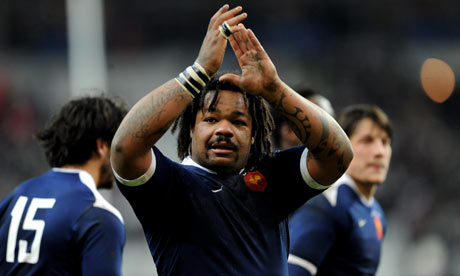
The biggest menace in French rugby starts today's match on the bench, which will offer some relief to Italy and a small contingent of French rugby followers who cannot bring themselves to forgive and move on, and who do not like seeing Mathieu Bastareaud anywhere near France's national rugby team.
Before the Six Nations there were more doubters. But two tries against Scotland and a sumptuous performance against Brian O'Driscoll in an emphatic victory over Ireland won most of them over. There remains, however, something elusive about him – obvious in the analysis of his rugby, for that is precisely what he is paid to be; frustrating when it comes to working out how he will handle his journey into sporting stardom.
A player larger than life on the field yet almost painfully uncommunicative off it is nothing new. Wales have – or had – Gavin Henson. The French stress that they can appreciate Bastareaud simply for his public performances but they, more than anyone, love a human drama and they simply adore the friction between extremes.
For all their love of the open road on the rugby field, the spaces that allow the French to be so very themselves, they have a special place too for their citizens who occupy the hard shoulder and lay the kerbs. Philippe Sella may be the ultimate pin-up of the French game but there are a few brutes bearing scars who are well loved, too.
They would be forwards, whereas Sella was a centre. Toughness is admired and so is elegance. Bridging the gap between the two extremes is Bastareaud.
He could basically be a prop, squat of torso and slightly squashed of face. He looks like somebody 15 years older than his 22 years, more like a prop battered by a life in the gruelling scrummages of the Top 14 than a travelling companion for the more classically graceful Yannick Jauzion in midfield.
Bastareaud is from the suburbs of Paris, brought up far from any showpiece écoles de rugby. He played for Creteil and Massy before being signed by the much more glamorous Stade Français. From the moment he hit the big time he was conspicuously different. He was sent off at the Under‑20 World Cup in 2008 for spear-tackling an Italian. Montages began to be assembled of this behemoth with ball in hand, dragging defenders by the half dozen over the advantage line and beyond.
Bastareaud is no triangular Adonis but is set square, with soft edges around the waistband. But the key lies beneath, huge legs that are over-engineered. They support his bulk but can accommodate an extra load of tacklers. Bastareaud keeps running when normal bodies buckle.
That might be a trait shared with quite a few props, but Bastareaud runs a whole lot faster than front-row forwards. He has fast feet for side-stepping and a turn of speed that takes him away from arms that would seek to make him fall. Even the technically blessed O'Driscoll failed to prevent his opposite number from powering through his grasp, far enough to deliver a try-scoring pass to Clément Poitrenaud.
The legend should tell that Bastareaud was nothing but grateful for his gifts and his big break and chose to become a role model for the underprivileged, a symbol of multicultural France. Instead, he still tests the patience of those that would see him a few kilos lighter, a player who does not have to take time-out to catch his breath. Ask French rugby-watchers about his fitness and they point to their mouths. "KFC," they say.
And then there was New Zealand. It was remarkable how a fabricated story about being beaten up by a gang of locals in Wellington provoked such a diplomatic storm, leading to apologies by the French Prime Minister, François Fillon, to his New Zealand counterpart, John Key. But that says as much about the sinking of Rainbow Warrior in Auckland Harbour in 1985 as it does about a drunken kid from the Paris suburbs on rugby tour in NZ.
Marc Lièvremont, the France coach, did not forgive his centre, not even when it was reported that after Bastareaud's return in disgrace he had sought psychiatric treatment and attempted suicide. Lièvremont waited, asked for an apology, and when it was delivered reintroduced him to the national squad. The coach now responds angrily to any questions relating to New Zealand, even if the truth has never emerged. How did Bastareaud sustain the injuries to his face?
They remain the mark against the reintegration of the centre, his betrayal of some sort of national honour. Perhaps he is merely abiding by the code of keeping it within his rugby family. Who knows? What is crystal clear is that when Mathieu Bastareaud runs at you there are no secrets and no hiding place. He is France's quiet man, causing mayhem out in the open of the Six Nations.

